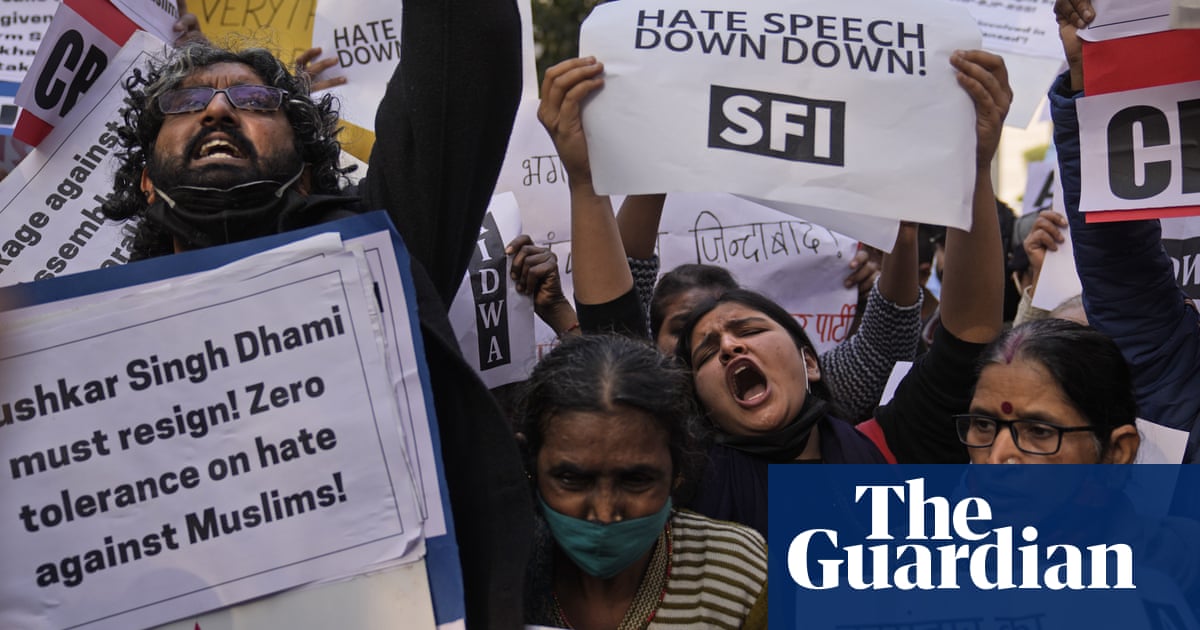
Show caption Protesters in New Delhi on 27 December demonstrating against hate speech after religious leaders in Haridwar, Uttarakhand, called for genocide against Indian Muslims. Photograph: Manish Swarup/AP India Arrests after female Muslim activists ‘put up for sale’ in fake auction in India Women say website aims to punish journalists, academics and artists drawing attention to hate speech Hannah Ellis-Petersen in Delhi Tue 4 Jan 2022 13.22 GMT Share on Facebook
Share on Twitter
Share via Email
Police in India have detained a woman accused of organising a fake online auction in which hundreds of prominent female Muslims were put up “for sale” on a website.
There were shock waves of anger and disgust in India after it emerged that a website calling itself Bulli Bai, an offensive term for Muslims, had set up a pretend auction of more than 100 Muslim women, including journalists, academics, activists, scholars and artists, where they were to be “sold” as servants for negligible sums.
Although no real transactions took place, the Bulli Bai website featured photos of the women, many taken from their social media and manipulated. A large number of the women targeted have been vocal critics of the ruling Hindu nationalist Bharatiya Janata party (BJP) government and many said the purpose of the site was to humiliate and silence outspoken Muslim women and help fracture India down sectarian lines.
It is the second recent incident where Muslim women in India have been harassed by being “sold” online, and follows a similar fake auction held online last July. Though several police complaints were filed in that case, no one has been arrested.
The Bulli Bai website was removed within 24 hours, and complaints were filed to the police by victims in Delhi, Mumbai and Hyderabad. On Tuesday, Mumbai police said they had detained a woman in Uttarakhand who is the main accused, and arrested a male engineering student in Bengaluru after extensive questioning.
Sayema Rahman, a popular radio DJ, found out she was among those featured on the website when a screenshot of her name and face was sent to her by a journalist.
“The most shocking part is that I’m not shocked any more because this has been happening relentlessly to women for quite some time now, especially with this communal angle,” said Rahman.
“It’s Islamophobia coupled with misogyny. I was targeted, and a whole lot of other women were targeted, because we are the vocal voices, we are the liberated voices, and they want to silence us by commodifying us, humiliating us and trying to scare us.”
Rahman said victims were still waiting for the prime minister, Narendra Modi, or the central government, in particular the home ministry and the ministry for women, to condemn the Bulli Bai website. “This is a massive national scandal but we are yet to hear a word from the central government condemning this or offering assurances, and that is very unsettling and very unnerving for the safety of women in this country,” she said.
Speaking to the Guardian, Rajeev Chandrasekhar, the IT minister, said his department’s investigative unit had looked into the website, and those responsible would be prosecuted. “The government of India is committed to ensuring the internet is open, trusted and safe for all Indians. We take this responsibility very seriously,” he said.
Khalida Parveen, 67, a veteran activist, was also among the women targeted. On Monday, she filed a police complaint in her home city of Hyderabad against the perpetrators, and the GitHub platform that had facilitated the site.
A GitHub spokesperson said it had taken down the user account that had hosted the website, and would cooperate with investigating authorities.
Parveen, in her police complaint, called for the perpetrators to be charged with “harassing me, horribly sexualising me, a senior citizen, and casting aspersions on me, and my character, and the community to which I belong” and also to be charged with human trafficking.
She said she had been “sad and angry” when she learned she was among those targeted. “What kind of mindset do these people have, selling me, an old lady, and other women online?” Parveen asked. “They are trying to silence our voices on social media. We see again how under this government, Muslim women are targets.”
Parveen said she felt the auction aimed to punish prominent female Muslim voices, including journalists and activists, who had called out hate speech against Muslims – such as a recent call by Hindu religious leaders, during a religious event in the Hindu holy city of Haridwar, in Uttarakhand, for a genocide of Muslims in India.
“Many of us were on social media, drawing international attention to this hate speech and demanding police cases be filed against the perpetrators,” she said. “Then we are all put up for sale on this auction. I think it is an attempt to scare us, make us fearful to raise our voices so we keep quiet. But we are all fighting this together, we will be aggressive for justice.”







